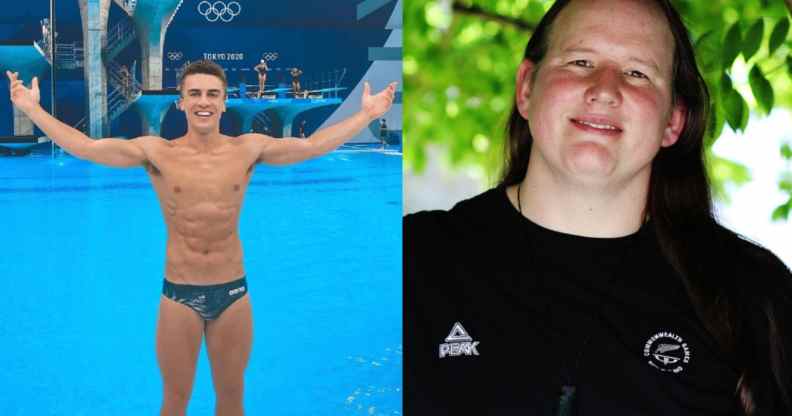Olympic diver Anton Down-Jenkins slams ‘nasty’ media coverage of Laurel Hubbard

Anton Down-Jenkins (L) threw his support behind Laurel Hubbard (R). (Instagram/Getty)
Olympic diver Anton Down-Jenkins has slammed the “nasty” media coverage of his fellow New Zealand athlete Laurel Hubbard.
Hubbard, a weightlifter, made history in August when she became the first ever trans woman to compete at the Olympics.
While her appearance was celebrated by many LGBT+ people, countless others used the opportunity to argue that trans women shouldn’t be allowed to compete in professional sports.
The media discourse was relentless – some newspapers misgendered and deadnamed Hubbard, while others ran demeaning articles focusing on her transition.
In an interview with Attitude magazine, Down-Jenkins hit out at transphobic media commentary surrounding Hubbard.
“It was really difficult to read a lot of things about her because it was so nasty, and I can’t imagine how that would have impacted her mental health and her performance leading into the Olympics,” he said.
Anton Down-Jenkins, who is gay, went on to explain that he considers himself lucky as he hasn’t encountered any homophobia in sport.
View this post on Instagram
Down-Jenkins added that “education” is essential when it comes to LGBT+ sportspeople.
“A lot of sporting governing bodies could do a better job educating about issues like inclusion.”
Down-Jenkins’ comments come after Laurel Hubbard bowed out at the Olympics without a medal when she failed to lift 125kg in the 87kg plus weightlifting category.
While Hubbard didn’t go home with a medal, she became part of trans sporting history in an Olympics that saw a record number of LGBT+ athletes competing.
She received a standing ovation in Tokyo, which stood in stark contrast with the often vitriolic media commentary she faced in the lead-up to the Olympic Games.
While her appearance at the Olympics was significant, Hubbard said afterwards that she didn’t think it should be seen as “historic”.
“As we move into a new and more understanding world, people are starting to realise that people like me are just people. We are human and as such I hope that just by being here is enough,” she told Newshub.
“All I have ever wanted as an athlete, is to be regarded as an athlete.”
While Hubbard’s Olympic appearance put a spotlight on her gender, it was far from the first time she faced unfair scrutiny.
In fact, Hubbard has been open throughout her weightlifting career about the transphobia she has faced. Speaking to RNZ in 2017, she said: “People believe what they believe and when they’re shown something which is maybe new and different to what they know, it’s instinctive to be defensive.”
She added: “Look, I can’t really speak for other people and what they feel, and what they think, and what they believe, and it’s not really my job to change what they think, what they feel or what they believe, but I just hope they look at the bigger picture rather than just trusting whatever their gut might have told them.”

